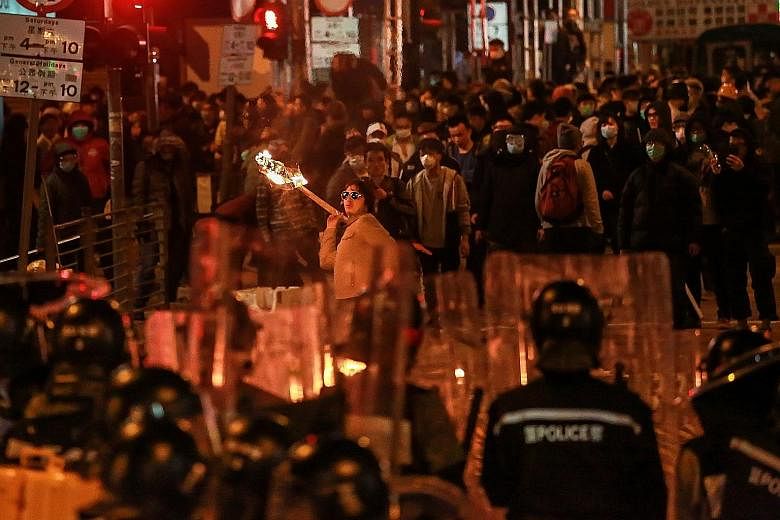During the 2014 Occupy protests, pro-democracy activist Ken Tsang threw a urine-like liquid at 11 policemen outside the government headquarters in Hong Kong. Seven of the officers then dragged him by his arms and legs to a dark corner of a building and beat him up. Their actions were captured and broadcast on television.
Tsang, 41, was jailed five weeks for his act, while the seven policemen, ranked from constable to chief inspector, received two years' jail each. Tsang, who could have been jailed two years for assaulting police and resisting arrest, hailed the court ruling as a "small victory for civil society against police violence".
The incident, rare in a city that prides itself on the rule of law, tarnished the reputation of Hong Kong's police force. It also highlighted the increasing pressure the police face from protesters calling for greater democracy and growing fears about China's interference in Hong Kong's affairs.
Further aggravating tensions, about 33,000 serving and former police personnel gathered to show support for what they called the unfair treatment given to the seven officers last month, arguing that their actions were provoked and came at a time of highly charged emotions and stress.
"When law enforcers fail to respect the law, this city is doomed," said high-profile activist Au Nok Hin, convenor of Civil Human Rights Front. The 29-year-old district councillor told The Straits Times that as a result of last month's police mass gathering, demonstrators like himself would now deliberately flout the law they deem unjust, accusing the police of failing to get prior approval for their mass assembly last month.
Mr Au is planning a mass gathering to disrupt the Chief Executive Election on March 26, the first leadership election since the massive Occupy street protests.
Protests have become a growing problem for the police and further clashes are likely in the city. The police face a group of more vocal and politically conscious youth, some of whom are willing to resort to violence to have their voices heard.
While overall crime figures dropped to 825 cases per 100,000 population, marking a new low since 1978, the police had to handle 13,158 protests and rallies last year, more than double that in 2015.
Analysts attributed the increase to Hong Kongers' fear of China tightening its grip on the city and further eroding its autonomy. Protesters have accused the central government of breaching the "one country, two systems" framework which promises liberties to Hong Kong after the city was handed back to China in 1997.
Anticipating trouble during the 20th anniversary of the handover to China on July 1, police are stepping up measures and purchasing more riot gear.
As at Jan 31, the police force had a total of 33,956 staff including 29,377 officers. It aims to recruit 1,540 officers this year.
Mr Jeffrey Herbert, chief executive officer of Centinel, an investigative firm and specialist in digital forensics, said the police, in carrying out their duty, could be sending the wrong message through their "erratic" actions, "swinging from harsh to soft and back again".
This could lead to some members of the public losing respect for them, further aggravating the situation.
"It took years to build up the image of 'Asia's Finest' and it is a pity to see this image eroded," added Mr Herbert, who spent 30 years with the Hong Kong Police Force.
Mr Steve Vickers, chief executive officer of Steve Vickers and Associates, a political and corporate risk specialist firm, said: "The real reason for the unpopularity (among these groups) was the Hong Kong government's unwillingness to interface with demonstrators on a meaningful basis.
"The government's inaction or lack of real dialogue with the protesters effectively threw the police under a bus with the consequent implications to (their) image."
While all seven policemen have lodged appeals against their convictions, some lawmakers and police supporters have called for new laws to protect the police from abuse.
Noting how video recordings could be used as compelling evidence against the police, Mr Eric Seto, partner of law firm Morley Chow Seto in Hong Kong, said the police could consider wearing body cameras.
"Not only can it improve accountability, it can also give the judge or jury a fuller picture of the circumstances of a case," said Mr Seto.


